Quality Eye-care for Whole Family
Pediatric Vision Care n Houston, TX to Northwest Houston, TX
It is very important every child has their annual vision exam. Early detection and treatment of certain vision problems can prevent vision loss in the future.
The American Optometric Association (AOA) recommends infants should have their first comprehensive eye exam by at 6 months of age. Then at 3 years of age, and just before they enter kindergarten or the first grade. (www.aoa.org)
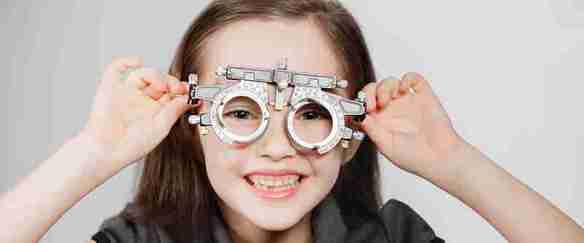
No matter the age, when scheduling your child’s appointment, try to make sure it will be a time your child will be more happy or cooperative. Depending on the age, there will be different tests performed during the exam. In all exams, be prepared to let your doctor know if your child was premature, has any delayed motor development, you are noticing any eye strain or fatigue, has poor visual concentration or tracking skills, or whether your child has failed any eye exam at school or the pediatrician’s office. You will also want to alert the doctor of any family history of eye problems or eye diseases.
Checking an infant’s eyes involves light. Their eyes are still developing, and it is important to make sure they are doing so normally. The doctor will check for pupil response to light, whether it opens and closes appropriately. They may also use a small light to check the baby’s ability to ‘fixate and follow’ the source. By the time your infant is around 3 months old, they should already be able focus and follow and object.
For children a little older, yet still not able to communicate, a chart with shapes and symbols rather than the alphabet is used. Random dot stereopsis uses dot patterns to check depth perception and the way the eyes focus together. Retinoscopy is a test in which a light is shined into the eye to examine the way it reflects from the retina. If a child needs any vision correction, this can help determine the prescription.
There are many important skills children must learn to maintain their ability to learn. These included: near vision; distance vision; eye teaming skills; eye movement skills; focusing skills; peripheral awareness; eye/hand coordination. It is just as important to make sure these skills are developing properly as it is to check for any of the common problems found in young children. Some of these include: amblyopia (lazy eye); strabismus (the misalignment of the eyes); convergence insufficiency (the inability to maintain focus on any items at close range), and focusing problems.
Content Sources: Pediatric Vision Care n Houston, TX to Northwest Houston, TX
Contact Lenses in Houston, TX to Northwest Houston, TX
Contact lenses are a great option for people needing vision correction. Some of the advantages of contact lenses over glasses can be less peripheral prismatic effect, fewer distortion issues, and avoiding foggy or smudged lenses. If maintained properly and good hygiene practiced regularly, contact lenses can be a great option for someone needing vision correction.
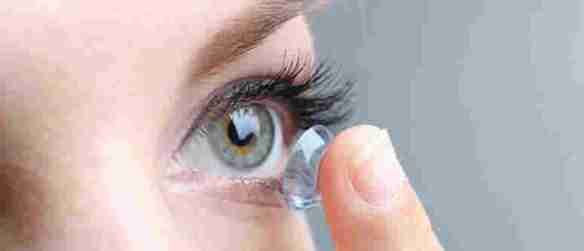
During a complete contact lens exam, our doctors will be able to determine the best type of contact lens for each individual. Whether you are looking for daily disposables, 2 week, 30-day extended wear, or hard or soft contacts, we are able to prescribe all major brands of contact lenses. We are also able to prescribe custom and specialized lenses for special needs, such as: bifocal contact lenses; astigmatism contact lenses; colored contact lenses; keratoconus treatment; orthokeratology (corneal molding); pediatric contact lenses; prosthetic contact lenses.
Our trained contact lens staff are happy to help with any questions you may have and are available if any future assistance is needed.
Content Sources: Contact Lenses in Houston, TX to Northwest Houston, TX
iFusion Exam in Houston, TX to Northwest Houston, TX
The new iFusion system combines OCT and digital fundus photography, the two most important imaging modalities in eye care, into one easy-to-use platform for a more comprehensive clinical evaluation. This combination is Optovue’s next step in its vision of bringing the most innovative imaging solutions to the broad spectrum of eye care.
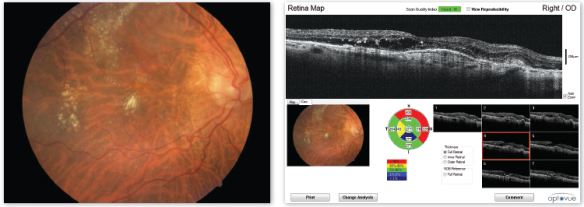
We are always working to bring our patients the latest in technology to not only diagnose potential eye related illnesses before they cause vision problems but to also provide the most comprehensive eye evaluations in the area.
Content Source: iFusion Exam in Houston, TX to Northwest Houston, TX
IWellness Exam in Houston, TX to Northwest Houston, TX
The iWellnessExam is a quick and non-invasive scan of your eye that lets your doctor see the layers of your retina to aid in the early detection of eye disease.
The iWellnessExam uses state-of-the-art spectral domain optical coherence tomography (SD-OCT) to produce high definition images of the layers of the retina (sensitive area of the back of the eye). Often compared to an MRI or CT scan, SD-OCT images provide stunning details of retinal structures that are not visible with other examination techniques or tests. This is important because it enables the doctor to detect very early signs of vision threatening disease, such as glaucoma, macular degeneration, diabetic retinopathy, and others. When diagnosed early, these conditions are easier to treat, slowing progression and often avoiding vision loss.
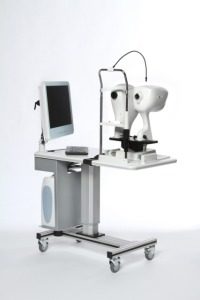
The iWellnessExam is non-invasive and can be performed quickly and easily as an initial first step in a routine comprehensive eye examination. The images produced provide a view of the retinal layers that enable the doctor to identify very early signs of disease, or confirm the patient’s ocular health. Early detection of retinal abnormalities and disease may lead to earlier and safer treatments and in many cases prevent or slow the progression of vision loss. The iWellnessExam is recommended annually regardless of symptoms, thereby allowing eye doctors to observe any subtle changes occurring over time.
VIEW BROCHURE ABOUT THE iWELLNESSEXAM HERE
Content Source: IWellness Exam in Houston, TX to Northwest Houston, TX
Comprehensive Eye Exams in Houston, TX to Northwest Houston, TX
In order to maintain your eye health, we recommend yearly eye exams. No matter your age or physical health, it is important to have these exams in order to detect and diagnose vision changes and potential problems.
During your complete exam, your prescription for eye glasses or contacts will be determined by your doctor. They will also check your eyes for common eye diseases and evaluate your eyes as a pair, and as an indicator of your overall health.
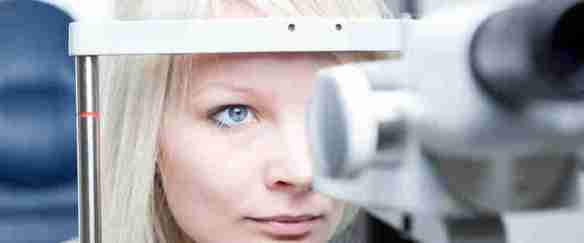
A number of tests and procedures are included in a comprehensive eye exam to evaluate the health of your eyes and the quality of your vision. These tests will include simple ones like reading an eye chart, to more complex test like using a high-powered lens to examine the health of the tissues inside of your eyes.
Children: According to the American Optometric Association (AOA), all children should have their eyes examined at 6 months, age 3, and again at the start of school. As long as there aren’t any vision problems or risk factors, children should then continue to have their eyes examined every two years after starting school. Otherwise, schedule an eye exam more frequently for a child with vision problems or other risk factors.
Children with glasses should schedule every year. Some experts estimate that approximately 5% to 10% of pre-school age children, and 25% of school age children have vision problems. Some common risk factors include: premature birth; developmental delays; turned or crossed eyes; family history of eye disease; history of eye injury; other physical illness or disease.
Content Source: Comprehensive Eye Exams in Houston, TX to Northwest Houston, TX
© Copyright htxeyecare